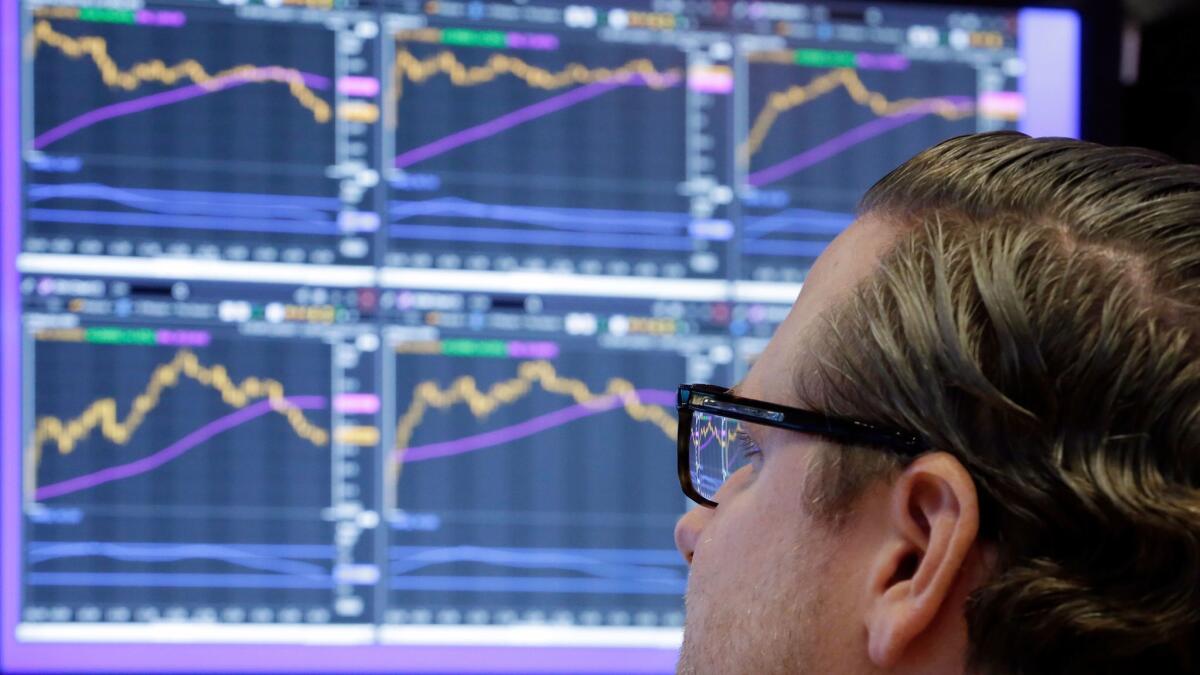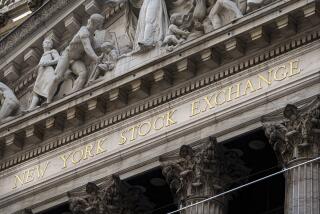Tech stocks slump, offsetting gains by telecoms and banks

Stock indexes didn’t do much at first glance Monday, but the modest move for the Standard & Poor’s 500 masked some dramatic changes roiling underneath the surface.
Telecom stocks, banks and other areas of the market that stand to benefit the most from Washington’s drive to cut corporate tax rates jumped. At the same time, technology stocks slumped, giving up a chunk of the gains that have made them the best-performing part of the market by far this year.
The New York Stock Exchange was nearly evenly split between stocks that rose and fell, and the split in performance left the S&P 500 close to where it began the day. It ended down 2.78 points, or 0.1%, at 2,639.44.
The Dow Jones industrial average rose 58.46, or 0.2%, to 24,290.05, and the Nasdaq composite slid 72.22, or 1.1%, to 6,775.37.
The cross-currents swept through the market on the first day of trading after the Senate narrowly approved its proposal to revamp the tax system. Indexes initially jumped on expectations that lower tax rates would help corporate profits pile up even higher, and the S&P 500 was up as much as 0.9% in morning trading.
Lower tax rates would help boost profits for companies, which already have been reporting resurgent earnings growth this year thanks to the improving global economy. If profits do accelerate, that would help allay worries that the stock market — which is still close to record highs — has climbed too far, too quickly.
Telecommunications companies pay some of the highest effective tax rates among the big companies in the S&P 500, so they stand to reap some of the biggest rewards of lower tax rates. Telecom stocks in the index jumped 1.6%, tied for the biggest gain of the 11 sectors in the index.
Financial stocks, which analysts also expect to be winners from the tax overhaul, likewise climbed 1.6%.
Technology companies, meanwhile, probably would get less of a boost. They already were typically paying the lowest effective tax rates of the 11 sectors in the S&P 500, analysts said.
Tech stocks in the index dropped 1.9%, lagging far behind the rest of the market. It’s a very different position for the sector, which has risen nearly twice as much as the overall S&P 500 this year. The strong gains earlier in the year led some skeptics to say that tech stocks had become overly pricey.
“It’s not that the tax bill is negative for tech companies,” said Ernie Cecilia, chief investment officer at Bryn Mawr Trust. “It’s just less positive for it than for other areas. The message is that although tax reform seems to be a positive, we have to see how that will play out on individual companies and industries.”
Adding to the uncertainty is the work that remains for the tax overhaul to become law. The Senate and House of Representatives still need to iron out differences in their respective proposals, and Cecilia warned that stocks could see more ups and downs in the coming days as details come out about which companies will benefit most.
Congress still has a packed schedule, the tax overhaul notwithstanding. Washington faces a Friday deadline to avert a shutdown of the government.
Friday is also the day the government will release its monthly jobs report, one of the last major economic reports before the Federal Reserve’s meeting next week on interest rates. Many economists expect the Fed to approve the third rate increase of the year.
And hanging over everything in Washington is the investigation that continues into Russia’s involvement with last year’s presidential election. President Trump’s former national security advisor has pleaded guilty to lying to the FBI and has agreed to cooperate with the investigation, which could threaten the agenda set by Trump and his fellow Republicans in control of Congress.
In Europe, stock markets rallied as negotiations continued for Britain’s exit from the European Union. France’s CAC 40 jumped 1.4%, and Germany’s DAX surged 1.5%. The FTSE 100 in London rose 0.5%.
Asian markets were mixed. South Korea’s Kospi rose 1.1%, the Hang Seng in Hong Kong gained 0.2%, and Japan’s Nikkei 225 index fell 0.5%.
In the bond market, the yield on the 10-year Treasury note held steady at 2.37%.
The dollar rose to 112.60 yen from 112.05 yen. The euro fell to $1.1855 from $1.1893. The British pound rose to $1.3471 from $1.3468.
Benchmark U.S. crude fell 89 cents to settle at $57.47 a barrel. Brent crude, the international standard, sank $1.28 to $62.45 a barrel.
Natural gas fell 8 cents to $2.99 per 1,000 cubic feet. Heating oil fell 5 cents to $1.89 a gallon. Wholesale gasoline fell 5 cents to $1.69 a gallon.
Gold fell $4.60 to settle at $1,277.70 an ounce. Silver fell 2 cents to $16.37. Copper was close to flat at $3.09 a pound.






